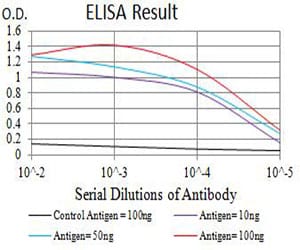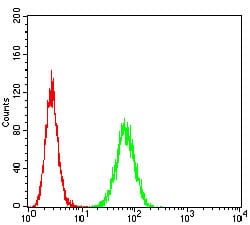


| WB | 1/500 - 1/2000 | Human,Monkey |
| IF | 咨询技术 | Human,Monkey |
| IHC | 咨询技术 | Human,Monkey |
| ICC | 技术咨询 | Human,Monkey |
| FCM | 1/200 - 1/400 | Human,Monkey |
| Elisa | 1/10000 | Human,Monkey |
| Aliases | CD254; ODF; OPGL; sOdf; OPTB2; RANKL; TNLG6B; TRANCE; hRANKL2 |
| Entrez GeneID | 8600 |
| clone | 7G3D7 |
| WB Predicted band size | 35.5kDa |
| Host/Isotype | Mouse IgG1 |
| Antibody Type | Primary antibody |
| Storage | Store at 4°C short term. Aliquot and store at -20°C long term. Avoid freeze/thaw cycles. |
| Species Reactivity | Human,Monkey |
| Immunogen | Purified recombinant fragment of human TNFSF11 (AA: 74-308) expressed in E. Coli. |
| Formulation | Purified antibody in PBS with 0.05% sodium azide |
+ +
以下是关于TNFSF11(RANKL)抗体的3篇参考文献及其摘要概括:
---
1. **文献名称**: *Denosumab for Prevention of Fractures in Postmenopausal Women with Osteoporosis*
**作者**: Cummings SR, et al.
**摘要**: 该临床试验评估了denosumab(人源化TNFSF11单克隆抗体)在绝经后骨质疏松症患者中的疗效。结果显示,denosumab通过抑制RANKL显著降低骨吸收、增加骨密度,并减少椎体和非椎体骨折风险。
2. **文献名称**: *A Single-Dose Placebo-Controlled Study of AMG 162. a Fully Human Monoclonal Antibody to RANKL, in Postmenopausal Women*
**作者**: Bekker PJ, et al.
**摘要**: 研究报道了单次注射抗RANKL抗体AMG 162(denosumab前体)对骨代谢的影响。结果显示,抗体可持续抑制破骨细胞活性,降低骨吸收标志物水平,支持其作为长期骨疾病治疗的潜力。
3. **文献名称**: *Structural Basis of RANKL Inhibition by Osteoprotegerin and Therapeutic Antibodies*
**作者**: Nelson CA, et al.
**摘要**: 通过冷冻电镜和X射线晶体学,该研究解析了RANKL与中和抗体(如denosumab)及天然抑制剂OPG的复合物结构,揭示了抗体阻断RANKL-RANK相互作用的关键表位,为优化抗体设计提供依据。
---
以上文献涵盖临床疗效、机制研究及结构解析,均为TNFSF11抗体领域的代表性研究。
TNFSF11 (tumor necrosis factor ligand superfamily member 11), also known as RANKL (receptor activator of nuclear factor kappa-B ligand), is a critical cytokine involved in osteoclast differentiation, activation, and survival. It binds to its receptor RANK on osteoclast precursors, activating signaling pathways that drive bone resorption. Dysregulation of the RANKL/RANK axis is implicated in bone-related disorders, including osteoporosis, rheumatoid arthritis, and cancer-induced bone metastasis.
TNFSF11 antibodies are therapeutic or research tools designed to neutralize RANKL activity. The most well-known clinical antibody is denosumab, a human monoclonal antibody that binds RANKL with high affinity, blocking its interaction with RANK. This inhibition suppresses osteoclast formation, reducing bone turnover and resorption. Denosumab is approved for treating postmenopausal osteoporosis, skeletal complications in malignancies, and giant cell tumors of bone.
Research-grade TNFSF11 antibodies are used to study bone biology, immune regulation (as RANKL is also expressed on T cells), and pathological mechanisms in preclinical models. Potential side effects of anti-RANKL therapies include hypocalcemia and infection risks due to the cytokine’s role in immune responses. Ongoing studies explore broader applications in autoimmune diseases and metastatic bone disease, highlighting the dual therapeutic and investigative significance of TNFSF11 antibodies.
×